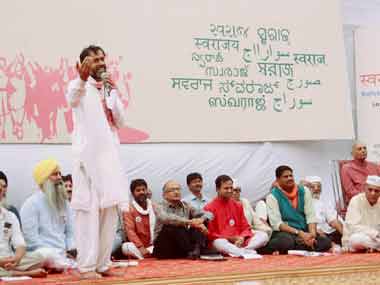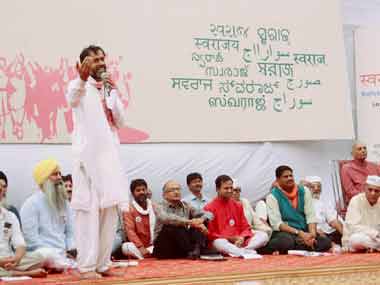We will neither split, nor quit; sudharenge aur sudhaarenge, Yogendra Yadav said after he was ousted from the AAP’s top decision making body in March. On Tuesday, the party’s volunteers who gathered for the Swaraj Samvad echoed Yadav’s thoughts: we don’t want to quit; we will fight for reforming AAP from within. More than two-third of the volunteers and leaders gathered at the venue said they do not want to split the party, only around 25 per cent of those present favoured a new party. The Swaraj Samvad organized by Yadav and Prashant Bhushan was meant to be a show of strength. But in the end, it ended up exposing the weakness of the rebels and their inability to do much except raise their voice and hope somebody listens. Their reluctance to take firm, affirmative action that could electorally hurt Arvind Kejriwal and his loyalists only underlined the helplessness of the rebels. [caption id=“attachment_2196916” align=“alignleft” width=“380”]
 Yadav, Bhushan and other leaders at the event yesterday. PTI image[/caption] Successful political parties arise from idealism; but they survive on pragmatism. Yadav understands India’s politics well enough to realise that a splinter group of AAP has no future in politics. So, he is right in not launching another AAP (Y or B) on the rebound. And the volunteers are right in preferring patience over political revenge. There is very little chance that a new party will be able to replicate what AAP has done in Indian politics. The circumstances that led to the birth and rise of the AAP have changed completely. The rebels and dissenters would fade into obscurity the moment they step out of the party. AAP was born because Indians were angry with the corruption and inefficiency of the UPA-II government. A spate of scams and scandals, coupled with a government that seemed arrogant and incompetent, brought India to a boil and created the environment for the rise of AAP, a party that appeared to be led by honest people who, voters assumed, would bring about real changes in politics and governance. Today that anger has disappeared; it has been replaced by hope instilled by Narendra Modi and his election campaign promise of ushering a brave new era of progress. Though people are getting impatient with the Modi government’s inability to bring about visible, perceptible changes, they have still not given up on him. Simultaneously, the AAP experiment has failed. The public spats between its leaders, sting operations on Kejriwal, revelations that he wanted to break the Congress to form the government in Delhi and the ugly spectacle that unfolded at the party’s recent conclave where Yadav and Bhushan were kicked out, have disillusioned people who believed AAP would usher a new way of doing politics. It is unlikely that people would want to start afresh and invest their hopes, energy and money in one more party. Kejriwal’s failure has effectively ensured that people will now be extremely wary of start-ups in politics. The rebels would have had a chance if they had a leader with a huge following among voters. Both Yadav and Bhushan may be great thinkers and ideologues, but when it comes to grassroot politics, both of them do not have any brand value outside the drawing rooms of urban India. The rebels may have hoped that AAP volunteers would be able to exert pressure on Kejriwal. But they didn’t realise that Kejriwal is no longer dependent on volunteers for the survival of his party. He has turned into a mass leader who can directly communicate with the voter. Kejriwal isn’t worried about slogans like internal democracy, samvad, idealism or transparency any more. He knows that his future depends on the performance of his government and the reaction of voters in Delhi, not on the mood of volunteers in Maharashtra or some other state. Volunteers outside Delhi, as far as Kejriwal is concerned, can go home. So, this looks like the end of the road for Bhushan, Yadav and their supporters, unless they, like Shazia Ilmi, join another party (A move that has yet to bear dividends). Since the Kejriwal faction had warned them against organising a meeting of rebels, Yadav and Bhushan will inevitably be expelled from the party’s primary membership. It is just a matter of time. In the end, Yadav and Bhushan will neither be able to reform the party nor split it to form a viable alternative to AAP. They will, unfortunately, have no other option to walk into the sunset of politics.
Yadav, Bhushan and other leaders at the event yesterday. PTI image[/caption] Successful political parties arise from idealism; but they survive on pragmatism. Yadav understands India’s politics well enough to realise that a splinter group of AAP has no future in politics. So, he is right in not launching another AAP (Y or B) on the rebound. And the volunteers are right in preferring patience over political revenge. There is very little chance that a new party will be able to replicate what AAP has done in Indian politics. The circumstances that led to the birth and rise of the AAP have changed completely. The rebels and dissenters would fade into obscurity the moment they step out of the party. AAP was born because Indians were angry with the corruption and inefficiency of the UPA-II government. A spate of scams and scandals, coupled with a government that seemed arrogant and incompetent, brought India to a boil and created the environment for the rise of AAP, a party that appeared to be led by honest people who, voters assumed, would bring about real changes in politics and governance. Today that anger has disappeared; it has been replaced by hope instilled by Narendra Modi and his election campaign promise of ushering a brave new era of progress. Though people are getting impatient with the Modi government’s inability to bring about visible, perceptible changes, they have still not given up on him. Simultaneously, the AAP experiment has failed. The public spats between its leaders, sting operations on Kejriwal, revelations that he wanted to break the Congress to form the government in Delhi and the ugly spectacle that unfolded at the party’s recent conclave where Yadav and Bhushan were kicked out, have disillusioned people who believed AAP would usher a new way of doing politics. It is unlikely that people would want to start afresh and invest their hopes, energy and money in one more party. Kejriwal’s failure has effectively ensured that people will now be extremely wary of start-ups in politics. The rebels would have had a chance if they had a leader with a huge following among voters. Both Yadav and Bhushan may be great thinkers and ideologues, but when it comes to grassroot politics, both of them do not have any brand value outside the drawing rooms of urban India. The rebels may have hoped that AAP volunteers would be able to exert pressure on Kejriwal. But they didn’t realise that Kejriwal is no longer dependent on volunteers for the survival of his party. He has turned into a mass leader who can directly communicate with the voter. Kejriwal isn’t worried about slogans like internal democracy, samvad, idealism or transparency any more. He knows that his future depends on the performance of his government and the reaction of voters in Delhi, not on the mood of volunteers in Maharashtra or some other state. Volunteers outside Delhi, as far as Kejriwal is concerned, can go home. So, this looks like the end of the road for Bhushan, Yadav and their supporters, unless they, like Shazia Ilmi, join another party (A move that has yet to bear dividends). Since the Kejriwal faction had warned them against organising a meeting of rebels, Yadav and Bhushan will inevitably be expelled from the party’s primary membership. It is just a matter of time. In the end, Yadav and Bhushan will neither be able to reform the party nor split it to form a viable alternative to AAP. They will, unfortunately, have no other option to walk into the sunset of politics.
Off into the sunset: Failed Swaraj Samvad spells political end of Bhushan and Yadav
Sandipan Sharma
• April 15, 2015, 16:59:45 IST
In the end, Yadav and Bhushan will neither be able to reform the party nor split it to form a viable alternative to AAP. They will, unfortunately, have no other option to walk into the sunset of politics.
Advertisement
)
End of Article